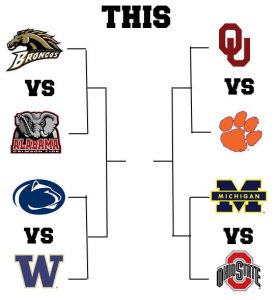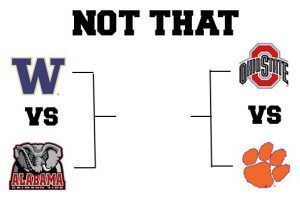 Last weekend I drove to Fort Worth in the pouring rain to see K-State run over TCU. However, if the clouds didn’t exactly part, the rain slowed to a very manageable drizzle for both the tailgating and the actual game. The ride home was as miserable as the drive that morning.
Last weekend I drove to Fort Worth in the pouring rain to see K-State run over TCU. However, if the clouds didn’t exactly part, the rain slowed to a very manageable drizzle for both the tailgating and the actual game. The ride home was as miserable as the drive that morning.
I would say I experienced the same emotional cycle when it came to the college football playoff selection process. Full disclosure, I am a Penn State fan. I don’t bleed blue and white and the closest affiliation I have to the University is that I once taught an accounting course at one of their branch campuses. Nonetheless, I am enough of a fan of the Nittany Lions that I was pulling for Colorado to upset Washington on Friday night. While the Huskies’ romp over Colorado didn’t cause me to fall into despair, I experienced a dull disappointment that was repeated in my soggy drive to see the Horned Frogs. And Penn State’s dramatic win was as pleasant a respite as the brief break in the Fort Worth weather. Sunday’s playoff announcement brought more disappointment, just like the ugly ride home of the previous rainy night.
After watching all the pundits and talking heads explain why the Washington Huskies were the better team, I was almost convinced. However, there was a nagging feeling that it just wasn’t right. It finally came to me during Sunday’s NFL games. The problem with the playoff selection process is that it is a selection process. The committee certainly has done good job. It is hard to argue with its results. The playoffs have been competitive and entertaining. Their stated goal is to have the four best teams in the post-season tournament and, by and large, they have been successful. Despite the reasonably good results, there is still something inherently wrong with a playoff that is dependent on a selection process.
 Games are played because the best team doesn’t always win. This is not figure skating. In football, the winner isn’t determined by judges, but by the play on the field. By setting up a process where there isn’t a path on the field to guarantee admittance to the playoffs, the integrity of the game comes into question. It is clear that the selection process is set up so that there are no guarantees – no path to the playoffs. Go undefeated? Sorry 13-0 Western Michigan, your schedule is too weak. Okay say the Sooners, we will schedule Houston and Ohio State. Sorry Oklahoma, you lost those two games, and even if it were the only two games you lost, tough luck you’re out. And so even though your conference added a championship game to improve your chances, beating No. 10 Oklahoma State in that game wasn’t good enough to cover out of conference losses. Maybe if you had beat Ohio State you’d have a head to head win to push you over the top. Of course PSU, we realize you beat Ohio State and won your conference but well, we just don’t think you are one the four best.
Games are played because the best team doesn’t always win. This is not figure skating. In football, the winner isn’t determined by judges, but by the play on the field. By setting up a process where there isn’t a path on the field to guarantee admittance to the playoffs, the integrity of the game comes into question. It is clear that the selection process is set up so that there are no guarantees – no path to the playoffs. Go undefeated? Sorry 13-0 Western Michigan, your schedule is too weak. Okay say the Sooners, we will schedule Houston and Ohio State. Sorry Oklahoma, you lost those two games, and even if it were the only two games you lost, tough luck you’re out. And so even though your conference added a championship game to improve your chances, beating No. 10 Oklahoma State in that game wasn’t good enough to cover out of conference losses. Maybe if you had beat Ohio State you’d have a head to head win to push you over the top. Of course PSU, we realize you beat Ohio State and won your conference but well, we just don’t think you are one the four best.
The solution is as simple as the one outlined last week. An eight team playoff bracket can give every a team a way to get to the playoffs on the field and leave a couple of slots open for the committee to give some deserving teams a second chance. Each power five conference champion gets an automatic bid along with one for the group of five conferences if that team is undefeated with at least one Power 5 conference win. The committee can fill in the other two slots with the current process. Simple and clean, and no longer worrying about the rouge Russian, err SEC judge.
The two primary arguments against this approach are that the regular season now won’t matter and that the conference champion could be an undeserving underdog. Let’s be clear, the regular season already doesn’t matter. Penn State beating Ohio State had no bearing on the Buckeyes getting into the playoff. All Ohio State had to do was beat Michigan and they were in. Likewise, had Michigan beat OSU, their lost to Iowa wouldn’t have stopped them from getting to the playoff, assuming they had beaten Wisconsin in the Big Ten championship. That is not a lot of compelling evidence for the sanctity of the regular season where every game matters.
The second argument about an undeserving conference champion is pure rubbish. The playoff effectively starts with the conference championship – win and you are in. Being the best team is about being the best consistently. Had Virginia Tech beaten Clemson, it should have eliminated the Tigers. It is a team whose play has been very inconsistent this year. Under an eight team format, the Hokies would have gone to the playoff. With three other at large bids, it is a tough argument that the Hokies in that instance are stealing a spot from a more deserving team. The beauty of the eight game playoff is that the championship is settled on the field. The byzantine process of determining a national champion in some part by the subjective opinions of coaches, sports writers, and former secretaries of state is long past its expiration date. It is time to make the national championship about winning it on the gridiron rather than in the conference room.
